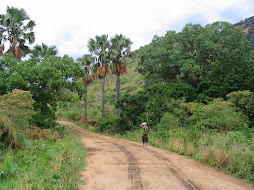In case you all have been wondering about Eunice, I went to her house the next day, brought her lunch, and we talked about her daughter's future. Then, the next day we talked again, after she visited her daughter, and both of them are doing better. They're thinking that once the baby is born and weened, the daughter will go to a vocational college, such as a teacher college, and the baby will stay with Eunice for 2 years. Thanks for your prayers.
So, what have I been doing work related for the past few weeks? Well, as I briefly mentioned in the last posting, I've been working from home/my office imputing data from the field into spread sheets. One of the big parts of Nuru is creating a baseline for each new project, in all 5 area of development. Once the baseline data is computed, then, for education, I'm projecting what our exit will look like. For example, as of now there is only 1 secondary school for the whole area; and it is inadequate at best. So, for the exit projection, there should be 2 fully-functioning and self-sustaining secondary schools-- one in each sub-location: Nyametaburo (existing) and Nyang'iti (TBA).
To decide on what the baseline is for our area, I had to collect the data in several different ways: going to each school, random sampling of household surveys, and surveying the students. Two of the hardest things to identify right now are a.) population and b.) literacy levels. The last census was done in 1999 and the next one won't be done until 2009; and so I'm using their projections for 2009, from 10 years ago, along with the findings from the surveys. I need to know how many children go to school out of the total amount of children in each area. Another snag in the process is that many of the children from bordering towns come from Tanzania. The Tanzanian curriculum doesn't teach in English, but rather Kiswahili, and most parents want their children to learn English. That's great that the TZ children are able to go to public school here, however its horrible from a research standpoint.
As for literacy, the last National literacy test was held in 2006, which isn't so out of date. The only problem with it is that they only tested from age 15 and up; and lumped the scores by District (i.e. Kuria as a whole, not by sub-locations such as Nyametaburo). Because of this, I'm debating holding a literacy test for the primary level, but still not sure which is the best format to use. If any of you teachers have some ideas, let me know. I know many of you who read this are all too familiar with IEPs and SpEd testing.
Currently, my counterpart, Francis, is tirelessly hiking around our 5 areas doing the household survey. He's doing to 10 houses in each of the 5 locations. I'm hoping to compile a guesstimation of the total amount of children versus the total amount enrolled. I'm also hoping to identify the total amount of disabled children are in the area. Mentally disabled children here don't go to school at all; and physically disabled children may or may not, depending on the severity of the handicap.
While Francis hikes around, I'm here typing the information that he brings me, along with creating a nice little package of research for our research team in Ohio, who are amazing and will do a lot of number crunching that I can't do. I sent a rough draft in to Gaby, the lead researcher, last Friday, and yesterday received feedback. So today I'm working on refining the baseline packet so that it will look nice to our reviewers. One of the things that sets Nuru apart is that we are having outside NGOs review our research for accountability and efficiency. We'll then take the review, evaluate it, and trim the "fat" from our data for a streamline NGO 2.0 development machine.
I took a break from the baseline this morning to update you all. The last entries have been sad, and not much about the work itself. Hopefully this entry helps all of you to understand more about what I'm doing on the Education side of things.
In 2 weeks our team will be taking a month-long break from the project. When living out here, it is important to leave the area, look away from the work, relax, and once refreshed, come back to the project with fresh eyes. Kind of like writing a paper for school-- when you're in the thick of things, with your head down and nose to the grind too long, things get muddy. An NGO 2.0 wants to be fresh, not muddy. As for me, I'm meeting up with one of my best-friends, Rachel, who's been a Peace Corps Volunteer in Lesotho since last June. We're meeting in Mozambique to catch up on the beach. After that, I'm visiting friends in Nairobi; Kampala, Uganda; and in Ikotos, S.Sudan (where I used to live). I cannot wait to see all my friends out here! But, until the end of next week, head down, and nose to the grind stone-- there's work still to be done.
Wednesday, May 6, 2009
Subscribe to:
Post Comments (Atom)

































1 comment:
WOW, very cool and crazy hard work, I will be very interested to see how you gather that data. We find it soo hard to get accurate figures on anything here having to do with employment, schooling,etc. sounds challenging but great! Enjoy your vaca!!
Post a Comment